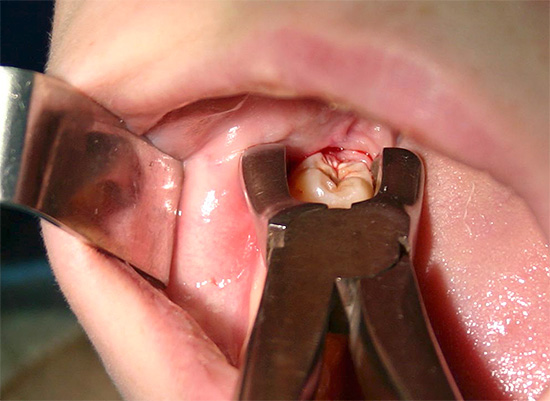
When it is impossible to save a sick tooth (or simply a problem one), dentists-surgeons come to the rescue, who remove it, trying to save a person from the corresponding pathology and health risks. However, it also happens that after the tooth extraction procedure, the formed hole does not heal for a long time and starts to hurt, and the suffering can increase with each passing day. In these cases, they speak of complications after tooth extraction, the various types of which we will further consider.
Unfortunately, some people relate to the problems that arise after the removal of a tooth, without due attention - they say, do not worry, it will be more painful and stop. Sometimes even obvious symptoms are ignored, which in some cases may well become fatal for a person, for example, prolonged bleeding from the hole, putrid breath, swelling of the tissues adjacent to the hole, and some others. So you can not do!
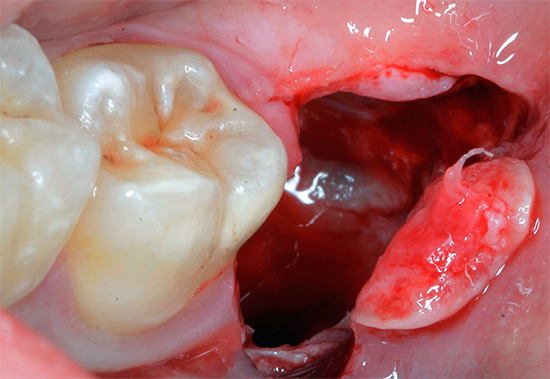
It must be understood that the removal of any tooth (especially a wisdom tooth) is not just an ordinary dental procedure, but an operation that involves the creation of an artificial wound, bleeding and traumatic inflammation of the soft tissues around the hole. As with other operations, there are always risks of the development of postoperative complications, which in this case, while suppuration of the hole, can lead to serious complications such as, for example, abscess, osteomyelitis of the jaw, phlegmon.
In the photo - the consequences of osteomyelitis of the jaw:
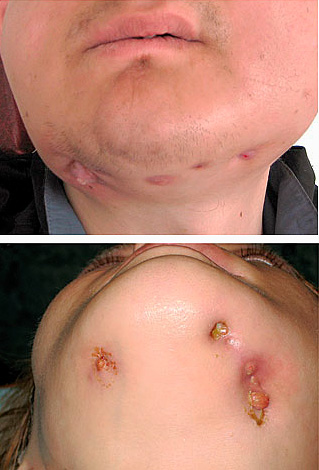
This is interesting: why does pain occur after tooth extraction?
The first source of pain is traumatized tissue throughout the entire area of the toothhole — the nerve endings here are irritated, causing pain. However, as the hole is filled with a blood clot, the soreness often disappears, as a kind of biological defense appears. The second source of pain is the periosteum - a film of tissue surrounding the jaw bone outside. When it is disturbed during anesthesia and (or) after extraction of a tooth, a hematoma may develop under it, which also causes pain.The third source of pain is swelling inside the jaw bone, which sometimes forms, for example, after traumatic removal.
With difficulty in teething wisdom teeth (pericoronitis), before their removal, an incision is made in the gum, as a result of which it is also traumatized, it can further hurt and even sometimes require specific treatment.
Loss of consciousness after tooth extraction
After the removal of a tooth, such a fairly common complication may occur, such as fainting or short-term loss of consciousness of the patient as a result of a strong psycho-emotional strain or stress. It arises against the background of deteriorating oxygen supply to the brain.
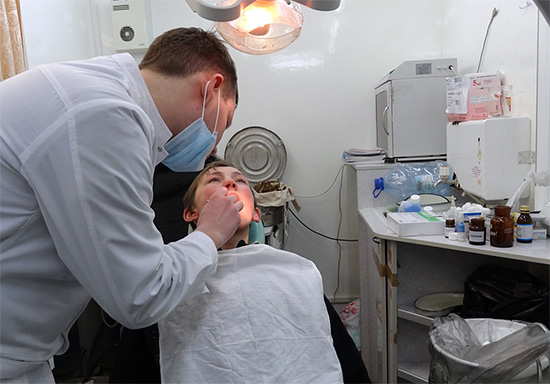
Temporary loss of consciousness is a common complication that, generally speaking, can develop both before the removal procedure and after. Moreover, as practice shows, even if you are a man who is not afraid of the sight of blood, this does not guarantee that in the course of, for example, the complex removal of a wisdom tooth, you will not lose consciousness.
Due to the fact that during the operation to remove a tooth, the dentist-surgeon may not act professionally enough, use imperfect work techniques, allow inaccuracies and mistakes,and in some cases even rudeness and incorrect behavior in relation to the patient’s personality, in such cases the risks of developing syncope after the procedure are significantly increased.
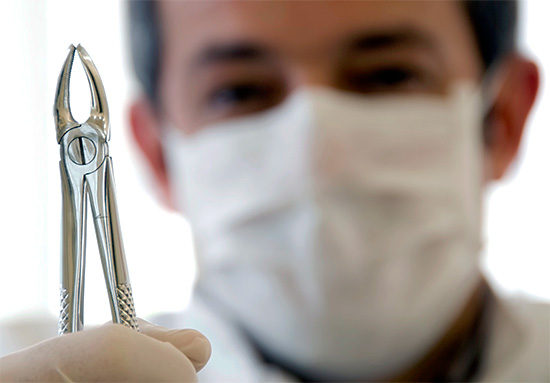
If the doctor adheres to the principle of an individual approach to his patient during the treatment, treats his health with care, is careful and polite to him, then the risk of loss of consciousness at the dental appointment is minimal. However, even in such cases, people who were frightened by the Soviet barbaric methods of root-removing teeth with a chisel and hammer still sometimes cannot overcome an overwhelming fear during surgery, the result of which can become such a common complication as a swoon - even against the background well done manipulation.
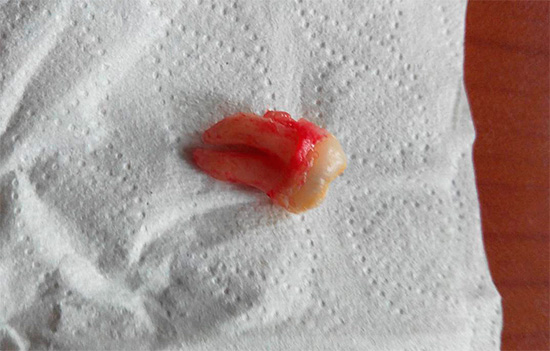
To restore consciousness to a person, the dentist performs an uncomplicated sequence of actions:
- Places the patient in a horizontal position;
- Provides fresh air;
- Relaxes tight clothing;
- Splashes face with cold water;
- Gives to inhale vapor of ammonia.
After inhalation of ammonia, consciousness usually returns in seconds.
From an interview with a dentist
I have been working for more than 15 years in surgery, and over the years of my working days in hospitals and clinics I have seen many interesting cases of fainting. Loss of consciousness can occur before or after a tooth is removed, it can be foreseen, or it can be overlooked. Of the most unusual fainting I can give a number of examples.
One guy (19 years old) literally 5 seconds before fainting, uttered a phrase addressed to me: "Now, doctor, I will disconnect." After which he lost consciousness.
In different years, there were two cases when, until the consciousness turned off in two young guys, the body was “shaken” for 5-10 seconds (convulsive faint), after which the convulsions stopped. And in the history there was no seizures or epilepsy, and consciousness returned in a minute under the influence of ammonia.
In my practice, there was also a case when a woman, after removing a tooth, abruptly rose from her chair and fainted, touching the doctor’s table and breaking the glass on it. By a happy coincidence, there were no serious injuries.
The main thing is that fainting is a short-term loss of consciousness, therefore, it is not necessary to be particularly afraid of this common complication neither to young novice doctors, nor to overly emotional and impressionable patients, but you should always be prepared for this.
Dentist-surgeon Stanislav G., Perm
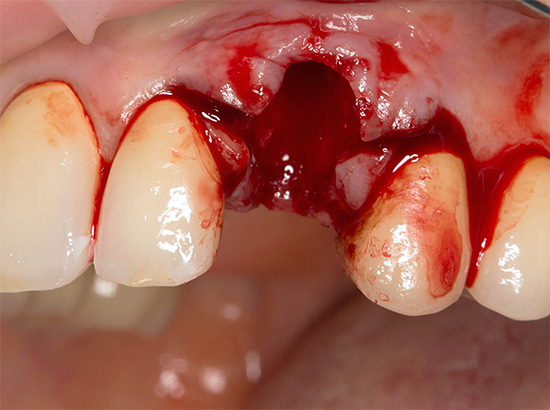
Local complications after tooth extraction
After removing the teeth, certain local problems or local complications can occur. The most common at the reception of a dentist-surgeon are the following types of complications after tooth extraction:
- Lunar bleeding;
- Incomplete tooth extraction;
- Alveolitis after tooth extraction;
- Paresthesia (loss of sensitivity).
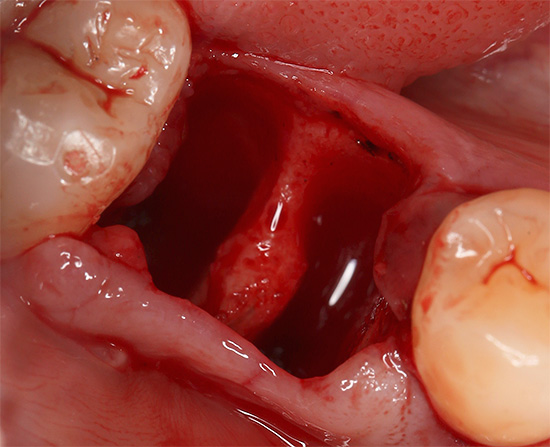
It is interesting
The most frequent complication after the removal of a wisdom tooth is an increase in body temperature on the day of removal, sometimes to high numbers (up to 38.0 degrees). If the removal was difficult, the tissue around the wound can be inflamed and swollen.
It is inflammation without the addition of purulent infection, as a reaction to a trauma in the mouth, that causes a rise in temperature, therefore, the detection of such an organism on the first day after the removal of a wisdom tooth is almost always not a complication. If the temperature remains high on the second and third day, as well as when other symptoms of possible complications appear (for example, putrid smell, severe pain), you should consult a doctor.
Lunar bleeding
Lunar bleeding can develop immediately after a tooth is removed, and maybe delayed - in a few hours and even later. It occurs when damage to the small vascular network in the tissues, and refers to local complications after tooth extraction. A blood clot performs the function of biological protection, so much depends on its proper formation.
The blood in the well should stop for a short period of time, on average, it is 5-15 minutes. In principle, a slightly bleeding well for several hours is also not a problem after tooth extraction. Such holes sometimes heal even faster than with a quick stop of blood. Another thing is if after the removal there is a strong bleeding that cannot be stopped by anything.
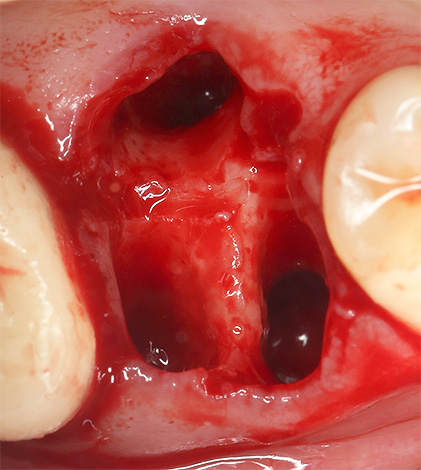
The most risky option is to stop the bleeding without understanding its causes. Preparations for stopping bleeding after tooth extraction You can enter intravenously (aminocaproic acid) or intramuscularly (Vikasol), put in the hole of the extracted tooth local means such as a hemostatic sponge or gauze pad over a wound soaked with 3% hydrogen peroxide.But without determining the true cause of the bleeding, all these treatments may be simply useless.
Possible true causes of bleeding from the well:
- Diseases associated with impaired blood coagulation, or damage to the vascular system of the blood (hemophilia, C-avitaminosis, acute leukemia, scarlet fever, hemorrhagic vasculitis, infectious hepatitis, etc.).
- Arterial hypertension (high blood pressure).
- Concomitant treatment with indirect anticoagulants, otherwise - drugs, "thinning" the blood.
- Elevated blood sugar in diabetes mellitus.
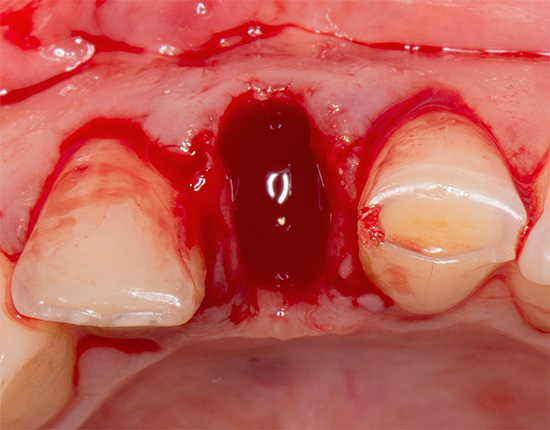
Such a complication after the removal of the tooth, as a strong and prolonged bleeding from the hole, can lead to a deterioration in the general condition of a person, the appearance of weakness, dizziness, pallor, a decrease in pressure. Most often, these complications develop after a rough removal of lower wisdom tooth, since it is in the area of 8 teeth that the most soft and well-supplied with blood tissue. Particularly traumatic may be the so-called complex removal of the 8 tooth, when it has to get out of the jaw literally in pieces.
Incomplete tooth extraction
In most cases, such a complication, such as incomplete tooth extraction, occurs only when the procedure is performed by an inexperienced or not responsible for the quality of the removal of the dentist-surgeon (do not think that this is an incredible rarity - such a doctor can also occur in a quite respectable dental clinic).
When a tooth is extracted from the hole along with the roots, or each root separately, then an important aspect of the doctor's good work is to check the extracted object for breaking off or splitting off a piece of root. If the doctor does not check the tooth after extraction, or knowingly holds back the problem in the form of breaking off part of the root in the tooth hole, and tells the patient that everything is normal, then the patient after removal, in addition to long-lasting pain, may have serious complications (suppuration of the gums, and in severe cases and without treatment - an abscess, up to osteomyelitis of the jaw).
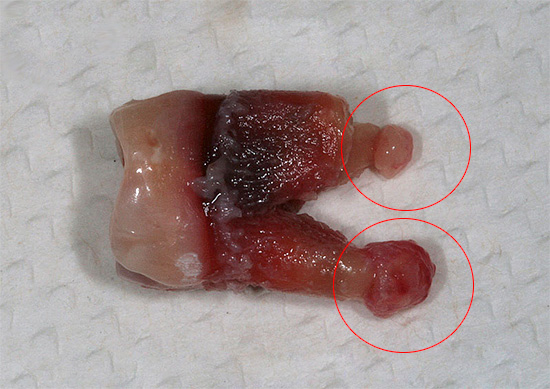
It is interesting
After leaving part of the root in the hole, another scenario is possible. After such a serious error on the part of the doctor, the hole may even begin to heal normally, and sometimes it is almost painless. If on the top of the left root there was “inflammation” in the form of bone loss or granuloma,or cysts of the tooth (purulent sac), then over time the process will only get worse, causing the development of infection in the area of this limited area.
It may take years before the granuloma or cyst "shoots" and a person gets such a complication as periostitis (flux), abscess or phlegmon, but access to the root left in the hole is already closed by the gum from above, so an urgent operation with a gumline will be required.
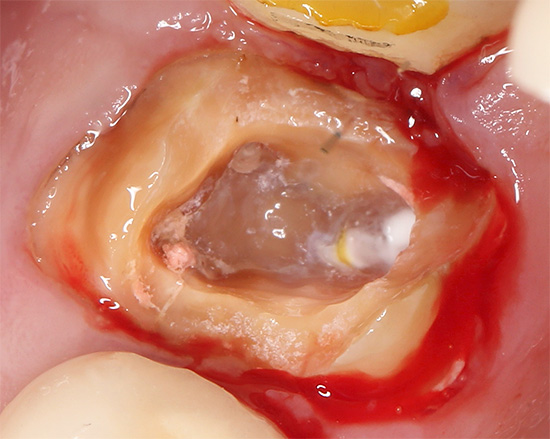
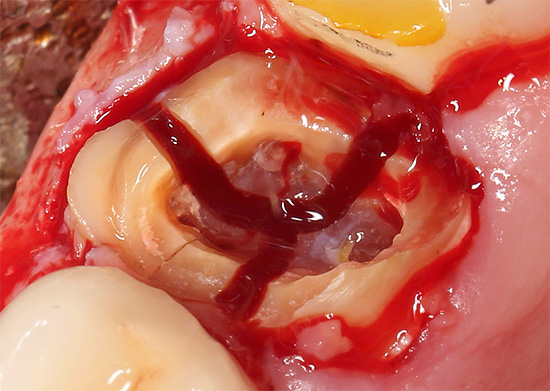
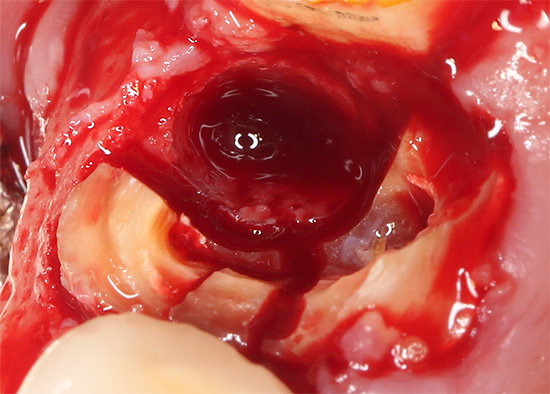
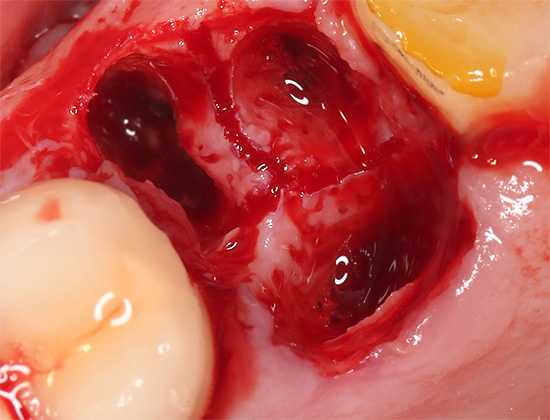
Alveolitis
Normal healing of the hole after tooth extraction It starts the process of replacing a blood clot with granulation tissue, which ultimately leads to the formation of osteoid tissue - a young bone. If a blood clot does not form after a tooth has been removed and an infection has got into the hole, or, for example, there has been a traumatic removal of a wisdom tooth with large tissue breaks, then inflammation (suppuration) of the walls of the hole occurs - alveolitis, which leads to pain and swelling of the gums.
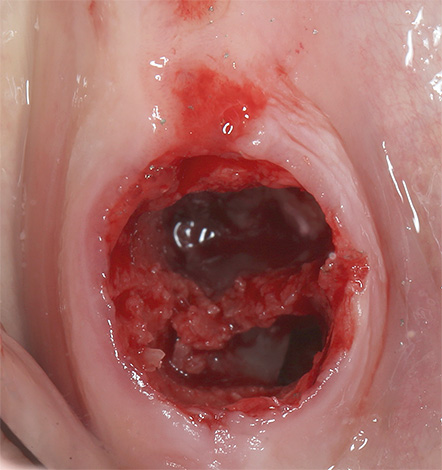
Often, there is a putrid odor from the mouth, purulent discharges from the well are observed: it is covered with gray bloom, there is almost always no blood clot or it is damaged, and the general inflammatory syndrome with symptoms of intoxication of the organism often develops.Due to the alveolitis and the associated purulent-necrotic processes, they can become inflamed, become painful when touched, and the lymph nodes grow in size.
Without proper treatment, there can be a transition of alveolitis to limited osteomyelitis of the jaw - a serious complication that occurs most often after negligent removal of a large molar tooth (for example, a wisdom tooth).
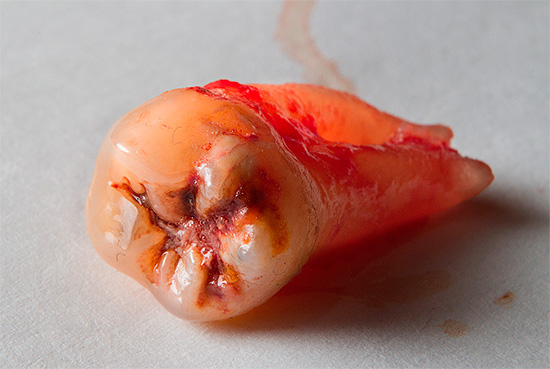
Paresthesia after tooth extraction (loss of sensitivity of the tongue, lips, facial areas)
Most often, this complication manifests itself after the removal of a wisdom tooth, and is almost always the fault of the doctor. Injuries to the deeper layers of the bone, there are risks of damage to the nearby nerves (lingual and inferior alveolar nerve), which causes numbness of the tongue, lips, chin and cheek, which does not pass for a long time.

With a small damage, the sensitivity recovers itself on average in 1-2 weeks. In more severe cases, treatment may require the help of a maxillofacial surgeon together with a neurologist.
Recommendations after tooth extraction for the prevention of severe consequences
In order for a well to heal after tooth extraction without serious complications associated with the addition of a secondary infection, it is useful to follow a number of rules that make life easier after surgery and reduce postoperative risks.
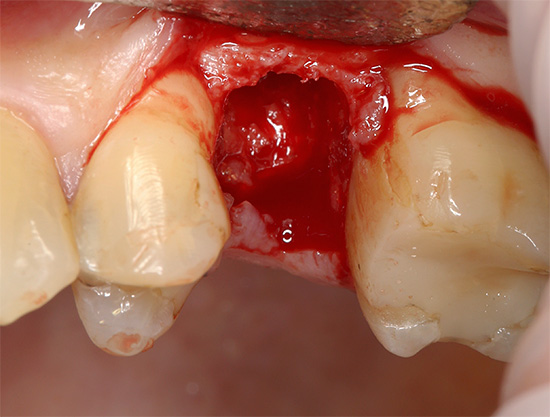
In order to feel as comfortable as possible after a visit to the dental surgeon, you need to:
- Remove the gauze pad 20 minutes after tooth extraction.
- About 3 hours do not eat.
- Apply a cold compress to the area of operation and repeat this action every 2 hours for 20 minutes (during the day after the intervention).
- Three days do not eat hot, rough and spicy foods.
- For 2-3 days to eliminate serious physical exertion, do not take a hot shower, do not visit the bath, sauna, solarium. Abandon sports. Protect yourself from overheating and overcooling.
- Do not rinse the wound after tooth extraction. It is better to do mouth baths: type antiseptic in your mouth - spit it out. For oral baths, it is optimal to choose decoctions of sage or chamomile.
- Avoid hard food, chew the first days after removing the other side of the jaw.
- Use a soft toothbrush for 5-7 days, while observing special care.
- Perform a doctor's prescription: if the dentist-surgeon prescribed antibiotics for a course of 7 days, then you should not interrupt the intake, because after such a break, the antibiotic may no longer work, because for a short use of the drug microbes often develop resistance to it.
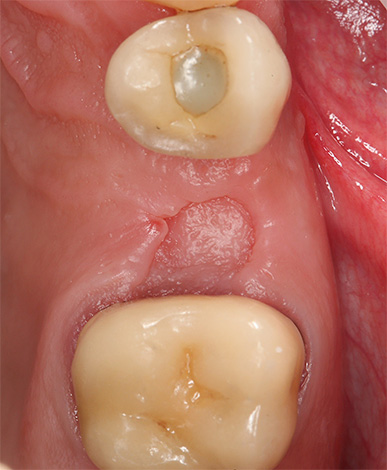
Long-term effects of tooth extraction
Alveolitis, abscess, osteomyelitis of the jaw, sometimes even sinusitis - these are the complications after tooth extraction, which may well appear if you do not pay enough attention to the corresponding symptoms in time. Meanwhile, almost any person can recognize the corresponding threat and prevent serious consequences - it’s enough to be guided by at least common sense and not be afraid to consult with a doctor once again.
However, common sense often does not work in those cases when the well heals normally and seemingly all is well: most people, rejoicing in the normal healing of the well for 2-3 months, forget that pale pink even gum on the site of the former patient A tooth is not an indicator of quality of life in the future.
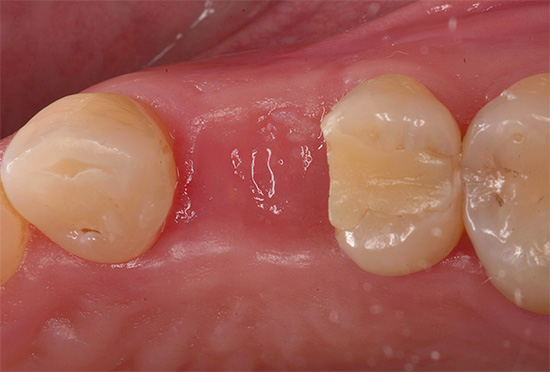
If it is simpler to say: the removal of a tooth requires its replacement with an artificial structure.It can be any crown, removable or bridge. In the end, no one forbids to put the implant in place of the extracted tooth, and then the crown or bridge, if the defect is extensive.
Inaction and anticipation of problems are very destructive, and sooner or later they come to every second owner of variegated gaps between teeth. First of all, I would like to say about the most desperate and careless citizens, who for years continue to bite and chew with their front teeth in the absence of all or the majority of chewing teeth, and each time complain that for some reason the fillings fall out quickly or the teeth are loose or are erased. It comes to the fact that the search for the truth leads such a patient to the doctor again and again, until the filling set 10 -15 times again breaks off, does not fall out, or until the tooth is erased to the level of the gums or loosened and removed "by hands".
Patients in search of truth can go very far, but at times they can’t understand basic things. After all, the dentition is a holistic and interconnected system. When a tooth is lost, there is a natural displacement of the adjacent teeth in the direction of the gap that appears.As a result, the patient can hear something like "teeth went" or "bite broken." And this, generally speaking, is also a kind of complication, which often occurs after tooth extraction, if no appropriate action is taken.
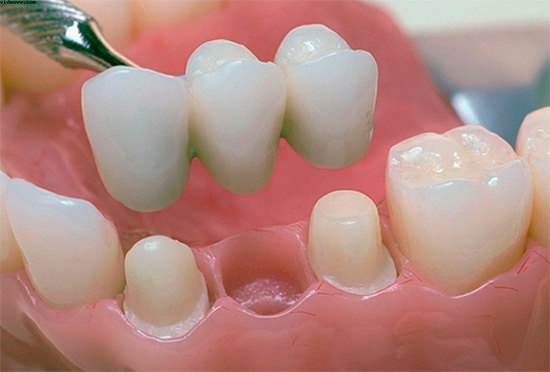
And how a tooth suffers, which has lost its “colleague” below or above! If he loses his antagonist from the opposite side of the jaw, then the load on him does not go, which means that the body considers him superfluous or foreign. Therefore, a person notes how a tooth begins, as it were, to gradually grow in the jaw, and in fact it advances, with a high risk of further “leaving” the jaw. And this is only half of what can happen without prosthetics.
If you touch the problem of clicking and crunching the joint of the mandible, then the common cause of its deformations and disturbances will surprise many people: the condition of the temporomandibular joint depends on the state of the bite. It must be said that in cases of disorders in this joint, hearing loss may even occur. That is why it is so important to replace the extracted tooth with an artificial structure as soon as possible.
Inflammation of the hole after tooth extraction: what can you expect in this case in the dentist’s office
What to do immediately after tooth extraction to prevent complications

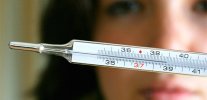
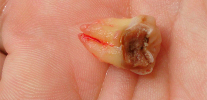
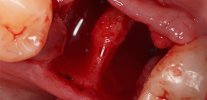
Good day. Tell me, please, what I have. A month ago, the removed eight figure was removed. Today, while eating on the opposite side, suddenly in a placewhere the tooth was removed, there was a crunch, as if the jaw broke, with a wild pain, and now the place of removal hurts, I can neither eat nor open my mouth wide. During a conversation and when I keep silent the pain is aching, but not strong. I can not bite anything, the feeling that the jaw is breaking apart. When feeling no differences, of course not ... But what happened, I do not understand. What could break with such a crunch? Ahead of the weekend ... How to be - I can not imagine.
I will add: I was in the morning at the dentist, they took a pan-shot, the doctor does not see any cracks and a fracture (it pleases). But now it hurts me when I tilt my face down, the feeling that some kind of gravity is pouring into this place, and I cannot chew even on the opposite side - the feeling that my jaw is parting. The real feeling is that something broke off. The doctor did not give any recommendations, said, be patient, must pass. What happened and what to do?
Hello! So just guess something is difficult, in such a situation is important inspection and pictures. First of all, I would like to exclude the subluxation of the lower jaw joint.Maybe during the meal there was a moment when he shifted with a crunch. The fact is that during the removal there could be excessive mouth opening + your existing joint deformities, which sometimes form over the years. Here you need to know if there was pain in the ear, a crunch in the joint, a knock, etc. In principle, nothing else comes to mind. I'm not sure that the doctor could leave the sharp edges of the bone or something foreign. It would be nice to show the picture of the hole not to the attending physician, but to another dentist with an independent opinion. If there is a suspicion of a joint, the temporomandibular joint imaging for deformation will help. Thanks for asking.
Good day. Appealed to the CLH, made a three-dimensional image, a crack in the angle of the mandible. They recommended a tight bandage for 2 weeks, calcium and mummy preparations, a Dimexidum compress at night, food for 6 months with grated and liquid food without chewing. In addition, the picture showed that as a result of the removal, the walls of the well were very thin. The operation was carried out by drilling. The doctor in the laboratory said not to strain his jaw and eat only grated food due to the fact that a fracture is possible before the formation of hard bone tissue in the hole from the extracted tooth.What else would you recommend? The fact is that in the next 3 weeks gynecology surgery is planned under general anesthesia, I am afraid that when I open my mouth to anesthesia and inject a breathing tube (or as it is called, sorry, I don’t know for sure) a serious injury could actually happen. What do you advise? Warn an anesthesiologist about a possible injury?
I will add that tooth extraction was in another country, so the surgeons in my city are independent in this situation.
Hello! Now the causal link has cleared a little. I think that excessive destruction of the alveolar process in the angle of the mandible, or excessive “persistence” and inaccuracy of the surgeon provoked the appearance of a crack. This, of course, is a serious complication after tooth extraction. I think that here only a warning to the anesthesiologist is indispensable. If the operation in gynecology is planned, then it is better to transfer it with supporting certificates (documents) that you have a number of nuances that impede the introduction of anesthesia, and in general - the fact of injury + not healed well after removal complicates the situation for the future gynecological treatment.If you cannot postpone for certain reasons, then it is important to consult a future anesthesiologist + operating gynecologist so that later you and your doctors will not have problems. Thanks for asking.
Thank you very much for your help in making the decision and giving advice. To transfer the operation is not possible. I will talk to a surgeon and an anesthesiologist, as you advise.
Removed 8-ku (48 tooth), 3 days ago. They put 3 stitches on the mucous membrane, as there was a large wound (the tooth was located at an angle of 90 degrees to the gum). Today the stitches are loose, a huge wound. What to do?!
Hello! Consult a doctor immediately, since the stitches are imposed largely so that the wound does not constitute a reservoir for infection from the oral cavity. I think that the doctor will find an opportunity to help you: if there is a need, the sutures will be reapplied, but not - then you will safely undergo treatment at home according to the adjusted list of recommendations.
Hello! Removed the root of the 5-ki (left top). On the left, a dead eight,also to be removed, she started to crawl out of the gum, as well as the dead 4-ka, also got out (almost sure) next to the 5-ki root removed three days ago.
Due to the rise of the eight, the bite has changed. And as far as 4 went out, I can’t check it out. What is the reason and how to put the 4-ku in place? It is planned to put the bridge in a month when the gum heals. The doctor has not yet been. Thank.
Hello! Unfortunately, it is difficult for me to understand the essence of the problem from your description. What 4-ka - it is not clear what you are describing. If you want, you can specify, and also send a panoramic picture, I will look at it and I will comment on it.
Tell me, please: the tooth is removed, the lower jaw, the gum is inflamed, periodically swells up, then passes. Went to the doctor - cut the gums, cleaned. What infection could cause?
Hello! I think that is not entirely correct: most likely, this is not about the infection by a dentist. The fact that you are faced with alveolitis - inflammation of the hole. This sometimes happens if the dentist badly cleaned the hole from foreign components (parts of the tooth, roots, granulomas, cysts, etc.),and often happens when the patient himself fails to follow the recommendations, even if the doctor did everything right. If the hole after removal turns into a kind of storage of bacteria and food from the mouth, its healing can be significantly complicated by the addition of infection. The only question is what kind of immune response is worth waiting for in a particular case, and he (this answer) is always individual. The fact that they helped you in your situation is good, but I have no idea what mistakes the dentist-surgeon made at the outset, and whether there were any mistakes, because the normal healing of the hole (without joining the infection to the wound) is the result of a full-fledged interaction between the doctor and the actions of the patient in the postoperative period.
Today removed the bottom retented eight. They spent an hour. Made 5 shots. They cut the gums and then picked something - it feels like they pick out a filling. Drawn a stick. Drilled, again pulled. And that's it, got a whole tooth. They cleaned the wound, put a clot (it was made from my blood from a vein), 4 stitches. Then they gave ice, kept it for about 20 minutes, then home. Cheek slightly swollen, swallow hurts.When the anesthesia is gone, she drank. Now it does not hurt much, only when swallowing.
In general, it does not hurt to remove. It hurts when the anesthesia goes away. But very scary. My legs were shaking and they were already dripping from my ears while they were being pulled out)) But now I understand that there was nothing to fear. While removed, the pain does not feel at all, only unpleasant. It hurts then, at home.
Five days ago, teeth were removed on the lower jaw, bone plastic was done. After removing the bottom four, there is still no lip sensitivity!
Hello, I have wisdom teeth coming out from below and above, simultaneously. Bottom almost completely broke, remained a little from the end of the gum, which rises to the touch (I don’t know for sure, it seems to be called a hood). And the upper tooth on the same side grows crookedly and presses on the other teeth, the gums are swollen, any touch causes pain. The whole mouth became inflamed, a lot of stomatitis appeared in the mouth, I almost cannot eat. The temperature rises to 38.5, swollen lymph nodes. But the worst thing is that my mouth does not open widely due to dysfunction of the TMJ, which has been around for more than 3 years.The mouth does not open fully to even yawn. I can not tolerate the pain of a wisdom tooth either. Tell me, is it really a tooth extraction with such a diagnosis?
Hello! You describe those symptoms that define the indications for an urgent removal of a wisdom tooth (s) (unless there are contraindications that require special removal conditions, for example, from the heart). Regarding the possibility of extraction of teeth in ambulatory specialists: unfortunately, I do not see how “little” your mouth opens. The fact is that I personally came across cases when the patient said that the removal of a wisdom tooth would not work, because the mouth does not open well, and I did it without any problems, because there were no serious obstacles to this. However, I cannot even diminish your complaints - if you say that the mouth does not open well, then suddenly, in fact, everything is very bad in this regard ...
The ideal option to not lose time is maxillofacial surgery with your hospital. There, experts are able to do anesthesia with the extraoral method, which is almost always not available to dental surgeons in hospitals and clinics.And this means that your case will not cause trouble to experienced doctors and everything will go as well as possible. Moreover, you already have a TMJ pathology, which is being treated in a specialized institution by maxillofacial surgeons: operative (if needed) treatment options are planned according to the diagnosis, or physiotherapy with bite correction according to samples.
So I’m telling you "from my bell tower" that the extraction of such teeth is quite realistic. However, if you want to remove your teeth as safely as possible and taking into account the accompanying pathology - now you know where to do it.
Hello! Please help with the answer. On Saturday, a tooth was removed, 6-ku, on the left side. There is numbness of the lower lip on the same left side, the lymph node is slightly inflamed. In the hole and around it appeared a gray film.
Hello! Judging by the description, there is a risk of developing alveolitis + as a result of a traumatic manipulation, paresthesia (numbness) has occurred. Inflammation of the lymph node may indicate a background infection, or an organism’s response to tooth extraction and the onset of purulent infection in the hole. I am sure that it is worth urgently to contact a dentist to assess the situation.It may be necessary to take a snapshot of the deletion area in order to outline an action plan to eliminate this problem. Thanks for asking.
On February 17, my daughter removed both lower wisdom teeth (as recommended by an orthodontist). Drank the prescribed course of amoxiclav (7 days). On March 6th, swelling appeared in the area of the angle of the mandible on the left, 7 increased. We went to the surgeon's LL — a new course of amoxiclav was prescribed for 7 days (875 mg 3 times a day). Puffiness of soft tissues has significantly decreased, but pus is released when pressing on the gum. Yesterday, the surgeon washed the gums and told me to continue drinking Amoxiclav. How many days can you take an antibiotic?
Hello! 2.5 weeks after the removal of the lower wisdom tooth, did a purulent process arise? To put it mildly, it is strange if everything is as you say. In addition to taking antibiotics, you must try to find out why this is happening. The reason can be anything: neglected alveolitis, infection in the adjacent tooth, not removed tooth roots (or root), fragments left in the hole, granulomas, cysts, etc.You say that the removal was planned, but nothing can be denied, because the situation is not typical. All the most unpleasant (acute symptoms, swelling, fever, etc.) should have happened in the first 3-5, a maximum of 7-10 days after removal, and then 2.5 weeks: from February 17 to March 6. Strange situation.
And about the antibiotic Amoksiklava - up to 2 weeks, depending on the severity of the situation and the available indications for admission.
Hello! Thanks for the answer. The fact is that now we are in Spain. After the removal of the teeth was a flight by plane, climate change. Before taking CHLH took a picture of the jaw - bone pathology was not detected. Amoxiclav drank 2 weeks. When pressing on the seam area, pus is secreted. The surgeon recorded an operation, but after 1-2 weeks. He said that if swelling reappears, drink levofloxacin 500 mg 2 times a day. But the child is 15 years old, and in the annotation it is written that up to 18 years is impossible. I do not know what to do…
Hello! Without seeing the clinical picture with my own eyes, it is difficult to say what allowed the doctor to retreat from the instructions and prescribe this antibiotic.Anyway, pus should not be for a long time. It is important to find out why such a deviation from the norm occurs, the health of the child is at stake. I would advise to get face-to-face consultations with several doctors. I know many cases when other doctors could find blunders of the first dentist, who stubbornly insisted on the impeccability of his approach to treatment. Pull no sense.
Hello! Tell me please. A week ago, I removed a wisdom tooth in the lower jaw. Removal was difficult. The first 2 days the wound was bleeding, but the temperature was up to 37. By 3-4 it rose to 38. After removal, the cheek was swollen in the upper part, two days later it subsided, but the tumor went down to the bottom of the cheek (although a small one). As such, there is no strong pain, but occasionally breaking through, throbbing! It still hurts to swallow and open your mouth a week later. The surgeon was a complete cad! I do not want to ask him. Tell me what to do next?
Hello! In this situation, it is better to turn to another dentist-surgeon, since the symptoms described by you inspire fear: edema, difficulty opening the mouth, temperature, etc.The fact that the doctor, as you write, "ham," can determine the possible remaining in the hole of tooth fragments, granulomas, cysts, etc. As a diagnostic, I would advise you to take a picture of the hole in order to know for sure whether a serious mistake was made by a doctor or not. Most likely, you need curettage of the hole: thanks to this, the wound heals as quickly and comfortably as possible. So I advise you to quickly find a good attending physician, consult with him (in person) and, possibly, correct the mistakes of the former doctor.
Hello. Tell me please. 2 weeks ago, the chewing tooth was removed. A week later, she came in with pain, washed, and she was prescribed cyfran (because she was allergic to penicillin) and low, propyl. Here, 2 weeks have passed, the hole is inhibited. I look around, and there is a white-yellow scurf, and twitches a little, but not much. Is it worth sounding the alarm? Thank you very much for the answer.
Hello! I think that the alarm should not be beaten. White-yellow bloom - a condition in the normal range. Chewing gums may disturb the gum until the hole is fully tightened. 2 weeks is a decent time for the situation to normalize.All the risks are long gone, there are no serious symptoms, that is, it is definitely not worth worrying about the plaque and some soreness of the gums. For more comfort and with a strong desire, you can do a follow-up inspection of the hole at the dentist: the doctor will not be offended for sure, and you will no longer scratch the cats in your heart.
Tell me please. Removed 8, after 3 weeks there was a sensitivity to cold and mild pain, especially after drinking cool water in the place where there was 8.
Hello! Apparently, in this case, you are worried about the 7th tooth, the far wall of which turned out to be with an open cervical area due to the "slump" of the gums (perhaps there is cervical caries). It is better to investigate this problem directly in the dentist’s chair in order to determine the exact cause.
It happens and the usual hypersensitivity on the background of a gum injury after the removal of a wisdom tooth - takes place on average for 1-2 weeks, but you say that you have it, after 3 weeks, which does not fit into the norm. So it is worth checking 7 tooth for caries. The sooner you begin treatment, the greater the chance of keeping the tooth alive without removing the “nerve”. Good luck!
Tell me please.In December, she removed the bottom eight, after removal, the jaw opened 1 cm for 2 weeks. The surgeon prescribed an MRI. MRI showed that everything is normal. Now the jaw hurts, crunches, the mouth does not open in full. What is it?
Hello! If you mean that the diagnosis of TMJ was performed using an MRI, then in your case “everything is fine” is unlikely. Definitely there is some kind of problem in the mandibular joint: a certain degree of deformity, change of position or “loosening” of the ligamentous apparatus. Six months after the removal of a wisdom tooth, there should not be any manifestations in the norm.
In that case, if the diagnosis of the joint or joints on both sides was not carried out - be sure to spend and get advice maxillofacial surgeon. If the doctor cannot see anything from the pictures taken, then contact other specialists. I think that the crunch and impaired mouth opening are caused precisely by the problem with the temporomandibular joint.
Hello! 4 days ago, the lower chewing tooth was removed, the procedure was a bit complicated, as the crown of the tooth broke off and I had to remove the tooth in parts. The root of the tooth had a slight inflammation, but before the procedure I did not feel it.After the procedure, the doctor pulled the tooth together with the root. The wall of the hole, on the side of the cheek, is a little broken. There was very little blood in the hole, but still a clot formed. The next day after removal, the cheek swelled up, the temperature rose to 37.4, the aching and very unpleasant pain tormented me. On day 3, the temperature was already asleep and did not rise anymore, but the hole was a little bit bloody, it was still sick and on day 4. The hole is covered with a grayish-red bloom. I open the jaw calmly, it does not cause trouble. The edema seemed to be sleeping a little, but just a bit, the pain remained. I drink painkillers, there is no unpleasant smell from the mouth. All of the above is normal?
The wound healed, but it hurts and the swelling is disturbing. How can you alleviate the condition?
Hello! According to your description, some concerns are caused only by the grayish color of the clot and persistent swelling of the gums. However, in the absence of other symptoms (fever, significant swelling, severe pain, putrid breath, etc.), one can hardly speak of an alveolitis. So I recommend to strictly follow the doctor's instructions, and get 1-2 consultations from him during the healing of the hole in order to remove all doubts.However, it would be wrong to recommend any drugs or procedures to you without personal examination, as it is fraught with complications.
Hello. Removed the 6th tooth. In place of the tooth, a white cloth appeared (I can't find the word, something like white gauze in appearance). Especially does not hurt, a little pain of adjacent teeth. I want to clarify, is it not dangerous?
Hello! A whitish or yellowish bloom on the well (blood clot) is not a pathology and often accompanies the process of wound healing after tooth extraction. The pain of the adjacent teeth in such cases is caused by trauma to the gums - this is temporary, the pain will decrease every day as the damaged tissues recover. Pain disappears on average in 5-14 days. Follow the recommendations of the attending physician and be healthy!
Tell me, please, is it possible to take hot injections on the day of a tooth extraction?
Hello! I would not recommend any procedures on the day of a tooth extraction without urgent need. In extreme cases, you need to consult a general practitioner who treats your underlying disease to weigh the risks.During and after tooth removal, the load on the body increases, and parallel intervention in its work at this time is not always advisable.
Visible septum of the lower jaw, the removal was difficult. Already a month the hole has not closed, what to do?
Hello! I recommend as soon as possible to correct the septum under anesthesia. It is not long, but it will provide comfortable conditions for healing. Moreover, you write about the difficult formation of the gums, although a whole month has passed since the removal of the tooth. Refer to the maxillofacial surgeon for an appointment and refresh the wound (you may need stitches).
Hello! Please advise how I should be. 4 days ago removed a wisdom tooth in the lower jaw. On the second day it became difficult to swallow. I thought it was a sore throat. On day 3, everything began to swell: the gums, glands, and the entire larynx. Outside swelling of the lymph node. I swallow with great difficulty and pain. The mouth, one might say, does not open. Temperature 35.8.
Hello! Address urgently to maxillofacial surgery where there is a hospital. May require hospitalization. According to your description, these are terrible symptoms, dangerous because the extraction of the tooth could not bring results, and the infection has already moved through the maxillofacial spaces, creating risks of sepsis and mediastinitis. Do not blame the doctor who removed the tooth, and, especially, to waste time on conflicts - immediately run for help.
Hello, 10 days ago I deleted 2 teeth - 8. One upper and one lower, both on the same side. On the other hand, 8 is also removed, but much earlier. There is the upper 7 tooth and the lower 6, which are sawn under the metal-ceramic on the same day. The wells are tightened, after surgery, stitches were applied. There was no temperature, the cheeks had swelling for the first few days. I felt great, then I felt a slight taste of pus, went to wash with Chlorhexidine, now I wash myself at home, the holes are tightened. But the question is different, my bite has changed)) I began to lisp, and the stoked 6th tooth in the bottom row began to bother me - it was hard for me to talk because of him. It seems that it interferes, like a bone.I want to cry, I feel inferior. What should I do?
Good afternoon, Oksana. In your situation, you need a consultation of an orthopedic dentist who plans treatment to the final result and proper bite. It is also necessary to be observed at the dentist-surgeon about the holes of the extracted teeth (so that there is no dangerous inflammation).
Violation of diction was manifested due to the removal of 8 teeth. This phenomenon is temporary, the recovery process will occur without additional interventions, although it will take some time, as a result, diction will be restored.
I consider the fact that 6 and 7 teeth were cut down on the day of removal, incorrect, as it is necessary to resort to orthopedic treatment after healing of the holes. It is possible that the inflammatory process that you mentioned when talking about the taste of pus was formed as a result of foreign particles getting into a fresh wound during the preparation of teeth.
Hello, 5 days ago, a wisdom tooth was removed, 38. It was removed twice, the first time the upper part was cut off, but that was a month ago. I made a free shot - I could not see the roots, I made a paid one - I had two roots.They were removed, for five days the place of the tooth and the gum with the tonsil hurt. By the way, the roots were removed by one crochet. Swallow hurts. Today was at the reception, they said that there are complications. What caused these complications?
Hello, Shakir. It is worth noting the lack of professionalism of the surgeon (possibly in combination with outdated diagnostic equipment). Skip 2 root of the tooth is almost impossible.
As for postoperative pain, this is a fairly frequent phenomenon, and is determined both by the individual features of the body and the possibility of attaching an infection (development of alveolitis). You are shown a dynamic observation of an experienced doctor until the complete disappearance of pain.
Hello! Tell me please. A week ago, periodontitis was treated on the right lower six. After the canals were cleaned, the medicine was put in and a temporary filling was put. The next morning, the cheek was very swollen and swelling appeared under the chin. Temperature, pain when swallowing and shot in the ear. They made a cut - it didn't help much. We decided to delete. They decided - they did it.The removal was quick, but the pain in the hole has been preserved for the 4th day, although it is of normal color and begins to drag on. It hurts and the upper jaw and lower. In the ear, the pain gives away anyway, swallow painfully. The edema on the cheek is a little gone, but it hurts under the chin and the edema remains. Saw antibiotic Leflok, rinsed with soda. Now doxycycline and rinsing with furatsilinom. Pain reliever constantly. To the doctor at the reception after 4 days. Maybe I should contact earlier and should I worry about my symptoms?
Hello, Natalia. Yes, in your situation it is worthwhile to consult a doctor earlier, as there may be dangerous complications - for example, the transition of inflammation to the maxillary cells. Perhaps as a result of an unsuccessful treatment of periodontitis, the infection has spread to the tissues, plus an injury has been inflicted during tooth extraction.
So do not wait and endure another 4 days, contact your doctor right now.
Hello. Two lower wisdom teeth were immediately removed - there was pressure on the seventh, terrible pain (they just got out and removed them). After removal, it hurts a lot during the month, it reduces the jaw.It hurts all. Was a neurologist - diagnoses the trigeminal nerve. A month has passed after the removal. Panoramic shot before deletion is available, do you need to do after deletion and contact the FLA? Because it seems to me that this is all because of the teeth.
Hello! Pain can be for various reasons, ranging from parts of a tooth left in a hole (or a cyst left) and ending with provoking pain by sharp edges of the hole under the gum (in this case, chewing can cause injury to the gums “from the inside” even after a month after tooth extraction) . Since severe pains are felt, it is advisable to take a panoramic picture, as this will give an idea about the state of the wells, as well as about the state of the neighboring teeth. Sometimes it also happens that after removing the hole it hurt, then the pain was almost gone, and after some time (after 2-3 weeks, for example), acute pain arises due to the destruction of the seven (six), in which pulpitis or periodontitis occurred . This option should not be ruled out until a full diagnosis has been carried out.
Good afternoon, the day before yesterday, the front 4 was removed on the upper jaw, the next day there was swelling. Inside the hole is a gray patina. Can you tell me what to do? There is no doctor nearby. Yesterday I started drinking tsiprolet, 1000 mg per day. I rinse not much rotokan.
Hello! The best option would be to visit a doctor, because without professional help alveolitis (if it suddenly arises) sometimes proceeds with complications, and home treatment helps slowly (if it helps at all).
If the dynamics do not improve, then it is better to go to the doctor. In this case, you will need to find out how well a tooth extraction was performed - inflammation of the hole is often the result of the tooth roots left in it, fragments, granulomas ... So, in the absence of a positive effect within 2-3 days, and especially a deterioration of the general condition and ( or) a condition in the mouth, you should immediately run to the doctor.
Hello! 3 days ago removed the bottom 8-ku. There was no pain, as usual. But the wound is very deep, there was no clot either. On the second day in the evening a little shot in the ear.On day 3, nothing hurts, there is no temperature, something white is kept in the hole, but there were no clots. What could it be? Is it worth to sound the alarm and run to the dentist?
Hello! Most likely, the doctor put the drug in the well to prevent alveolitis and (or) improve the healing of the hole. In general, the light color of the edges of the wound or the bottom of the hole in the absence of other symptoms is the norm when you should not run to the dentist. In the absence of negative dynamics, it is enough to follow the recommendations of the doctor and wait for the gingival crest to fully recover.
Good day. After removing the 8-ki did not know that you can not take a shower. I barely stopped the bleeding from the nose ((After the cheek swelling for 3-4 days ... A week passed, the gum is no longer disturbing, the tumor has subsided. But every day I spit up blood from the nose. It feels like there is always increased pressure. What is the reason ?! He pulled out a tooth in Nigeria, in the village (although it is difficult even to call this place that way), and I doubt that there are good specialists in such a hole.
Hello! I assume that you are writing about the removal of the upper wisdom tooth,when removing which occurred damage to the wall of the maxillary sinus (maxillary, if the old). It is because of this that nosebleeds are possible and not only. I am sure that we need a confirmatory picture, which most likely will reveal a damaged wall, or (it happens a little less often), the bottom of the hole closely communicates with the sinus, because of which, against the pressure, the hematoma leaks as blood into the sinus, from which it gets in the bow.
Regarding bad specialists in Nigeria: this can happen in any country if you have the anatomy of the upper wisdom teeth that has this feature. This is not uncommon, but not very frequent. Rather, these are occasionally occurring cases with any dental surgeon. For some specialists, this practice can occur more than 10–20 times, for others - no more than 3-5 cases of the total number of patients (per 1,000 admitted patients).
Hello. A week ago, I removed the bottom eight of the left back. Removal was difficult, the tooth was divided into two parts to pull out. From the next day, the cheek was swollen, sore, the temperature kept at 37.2.At the moment (7 days later) the temperature is around 37 in the evening, there is practically no swelling, only a slight swelling of the cheek from the bottom where the tooth was removed. The pain is weak (the anesthetic for all time has only been drunk 2 times), but at the same time the tongue on the left hurts with sudden movements, it is a little painful to chew and open the mouth. In the mirror, the gum is very badly seen from that side, but it seems that where the seams and tubercle of the gum are in place of the tooth, there is either a crease, or a fossa on the side, or a gum was sewn, somehow strange. And with some movements of the tongue, something seems to be stretching badly. If you used to open your mouth wide open, it was not a problem, but now the mucous as if stretched and gives pain somewhere in the palate. All this week saw antibiotics prescribed by the dentist, rinsed mouth with chlorhexidine. Worried about seams and temperature. Can it last so long?
Hello. The initial stage of healing of the hole after the removal of a wisdom tooth can last up to 2 weeks - the edema and hematomas dissolve, the pain disappears, the temperature returns to normal. However, usually a high temperature is observed no more than 3-4 days.In your case, the process is clearly delayed. This does not mean that something is wrong - the healing process is different for everyone, but there is still reason to consult a doctor to find the source of inflammation that causes an increase in body temperature for such a long time. Most likely, the doctor will confirm that the healing of the hole is normal, but full-time consultation will not hurt - after a complex removal of impacted teeth, this is especially true.
As for the seams, it is difficult to say something according to the description. But it’s still too early to worry about them - the healing process has just begun, so the discomfort is quite natural.
Goodnight. 6 days ago, they removed the horizontal one. They removed about 45 minutes, more precisely, two roots: one grew up to the tongue, and the other rested on 7. They tapped out and suffered for a long time. 7 days passed, the jaw crunches from this side, near the ear. What to do? Tell me please.
Hello. During the procedure, excessive pressure on the area of the tooth being removed could lead to an excessive tensile load on the ligaments of the temporomandibular joint (in very rare cases, if the doctor acted incorrectly, the jaw might be dislocated altogether).In such cases, it is necessary to give maximum peace to the joint in the next 2-3 weeks (avoid wide mouth opening, exclude hard foods). The situation should gradually return to normal, but if you notice that this does not happen (there is no positive dynamics), then it is better to see a doctor, since problems with TMJ can later lead to a number of complications.
Good day! My aunt removed 8-ku from the bottom right. Over the next two days, she was nauseated and she lost consciousness several times. They called an ambulance, the doctor diagnosed: vegetative-vascular dystonia. More than two weeks have passed, a wild headache does not go away, only anesthetic injections are saved. They made a circular shooting of the jaw - they say that everything is in order. I went to the manual, the pain in my head subsided a bit, but it still follows. And the bottom left felt numbness. Tell me, please, what is necessary to be examined, what is the cause of similar symptoms? Is the trigeminal nerve damaged? Thank you in advance for your consultation.
Hello. Such a state could be caused by the general vascular reaction of the body to the transferred stress.Numbness of the lower lip and chin indicates trauma to the mandibular nerve or its compression by the hematoma that has arisen. Usually, after the removal of a wisdom tooth, sensitivity is restored in a period of 1 to 6 months (in very rare cases when the nerve is seriously damaged, numbness can last for years). To clarify the situation with a long headache, it makes sense to go to 1-2 good clinics (not dental, about the general profile) and get the opinions of different specialists. Physiotherapeutic treatment can also be prescribed there, which sometimes helps with paresthesia, helping to accelerate the recovery of sensitivity of numb areas of the face.
Hello. Removed a wisdom tooth, put a turunda, then in the next reception, it was removed. After I ate, food got stuck in the hole. I used to get water in my mouth and then spit it out. Like, all cleaned up. When I did it, I did not wash away the clot! Then, looking at the hole, I saw a bone! This is normal? And can the hole of the tooth be closed with food left inside?
Hello, Alina.The hole can not close with food inside. As for the bone - perhaps you took fibrin for bone (this is a white patina, indicating a normal healing process). If you nevertheless rinsed out a blood clot covering the wound, and thus exposed the bone, then the healing can be dragged out without medical intervention (in such situations alveolitis often develops). Since the situation is not clear, I recommend to consult with your doctor in advance to clarify it.
Hello. Tell me, please, what can it be? In May of this year, she noticed an increase in the parotid and submandibular lymph nodes on the right, without pain. After some time, there was a "running" pain in the chewing teeth on the right. I went to the dentist - there are normal teeth in the pictures, but since the pain was most in the second lower tooth from the ear, I was treated and sealed. They said that they should not get sick. But the pain persisted. I took a panoramic picture, there was visible retained wisdom tooth from below. I went to the headquarters of the 17th of June, the tooth was hardly removed, the sutures were put, the drainage was set. Healed all good drainage removed.
After a while, the pain appeared in the first lower tooth. I went to the dentist again. I was told that everything was fine there, they cleaned the stones. They said that if he was ill, go to a neurologist. Indeed, the pain has returned. I went to a neurologist. She confirmed that after the removal of a tooth, a nerve could hurt, she prescribed a treatment that included dexamethasone. I was treated. At the time of treatment, nothing hurt and everything was fine. But a week went by as I stopped treatment, the pain returned, but it became another. The treated toothache, the second lower tooth from the ear, and the bone under it hurt. There was a restriction of opening the mouth (not strong). Tell me what to do? Thank you so much for the answer.